

Confronting Linguistics as a Racist Discipline Friday, July 5, 2019 1
2 Announcements • Schedule for Week 3 is now on Orbund (or coming soon) • Heads-up: Assignment 4 will be due on the last Friday of class at 5 p.m., but it’s just a revision of Assignment 3 • Feedback on Assignment 3 will be provided on Wednesday, July 17 • Don’t forget the Advancing African American Linguist(ic)s Symposium tomorrow and Sunday! • Today is my last day at the Institute, but I’ll try to Zoom into class and I’ll still have office hours via Zoom
3 The racism of linguistics • Due to its colonial roots, linguistics has a longstanding and ongoing racist legacy that it has not confronted • Linguistics is not uniquely racist; practically all disciplines are, as is pretty much the entire academy (and the entire society), including in the following ways: • Disciplinary content, scope, and ideologies • Scholarly practices (theory, method, writing) • Inequities facing students of color (curriculum and other requirements, recruitment and retention of undergrad and grad students, mentoring…) • Inequities facing faculty of color (recruitment and retention, tenure/promotion, workload…) • How departments, disciplines, and organizations function (climate, leadership selection, policies and decision making)
4 “That’s not linguistics” • Disciplinary border policing excludes many of the topics of urgent importance to students and scholars of color, especially “applied” topics that are devalued • Education • Legal justice • Health care and access • Activism • Other community needs • This utterance reveals many linguists’ insecurities about their disciplinary identity; they just need to get over it • If a linguist does it in their capacity as a linguist, then it’s linguistics! • Pro tip: You only need your advisor to go along with your project, not the whole department/discipline
5 Some of linguists’ (racio)linguistic ideologies • Linguistics is an objective science • Linguistics isn’t about knowing a lot of languages • Linguists are descriptivists, not prescriptivists, so we can’t advocate for inclusive language use • Languages exist (Leonard 2017; Otheguy, García, & Reid 2015) • The distinction between languages and dialects is linguistic, not social (even when linguists say otherwise) • The lexicon, all of sociolinguistics, and other culturally significant aspects of language aren’t “interesting • Exoticism: Only “unusual” languages are worth studying OR False universalism: All languages are pretty much the same, so let’s just study HAVE • Indigenous languages are precious vanishing resources (Davis 2017) • Linguists are experts, language users are naïve, and “we” can’t trust what “they” say about language (Collins 1991)
6 Racism in epistemologies, methodologies, and scholarly representations • Linguistic theories, methods, and writing practices are white, Western, colonizing, and racist • e.g., the “objective” white gaze • The discipline has an urgent need for Indigenous, Black, and other alternative theories and methods • Critical Race Theory (and critical race theory) • http://linguisticanthropology.org/sla-blog/creating-online-resources-l anguage-revitalization/ • Exclusionary and distorted representations of racialized groups in research articles, monographs, and textbooks (Morgan 1994a, 1994b; Walters 1996)
7 Inequities facing students of color • cf. Zentella 2018 • Finding linguistics, knowing what it even is • Feeling (un)welcome in the major • Highly technical/abstract required courses that drive students away • Course content that excludes their linguistic repertoires • Tokenism (e.g., bias against “diversity” recruits; commodification of racialized students; being called upon as an expert on ”their” language in class) • Not having instructors who look like them or share their lived experiences • No/few assigned readings by scholars of color • The hidden curriculum: Not being told the rules of the game
8 Inequities facing faculty of color • Rampant structural and individual racism on the job market • Doing work that isn’t recognized as linguistics • Massive uncompensated service overloads, especially student mentoring and committee work • Senior colleagues who devalue or discourage innovative research programs • Lack of meaningful mentoring or peer support in the department (and possibly anywhere on campus) • Unspoken expectations and shifting goal posts for tenure and promotion
9 How departments, disciplines, and organizations function • cf. Battacharya, Jiang, & Canagarajah 2019 • Hostile climate and no recourse • Exclusionary practices and outcomes in selecting leaders, making decisions, and rewarding “excellent” work • Reproduction of the same unjust system: “We’ve always done it this way” • Invocation of “standards” and “quality” as justifications for perpetuating white supremacy
10 What’s been working at UCSB • Find your allies, sideline your antagonists •Create a critical mass •Offer flexible programs •Welcome innovative research •Reward social justice and service work •Establish clear procedures in writing •Additional goals • Better funding • Better mentoring for every student (grad and undergrad) • Make non-sociolinguistics classes more inclusive (e.g., talk about AAE in morphology class and Spanglish in syntax)
11 Discussion: How can you intervene to make linguistics a little bit less racist? • Assignments 3 (draft) and 4 (final version): Come up with a racial justice plan for linguistics or the academy that you could actually carry out (and we hope you do!)
12 Conclusion • We have a lot of work ahead to undo the white supremacy of linguistics, but it can and must be done! • The next two weeks: Making linguistics less racist
Recommend
More recommend